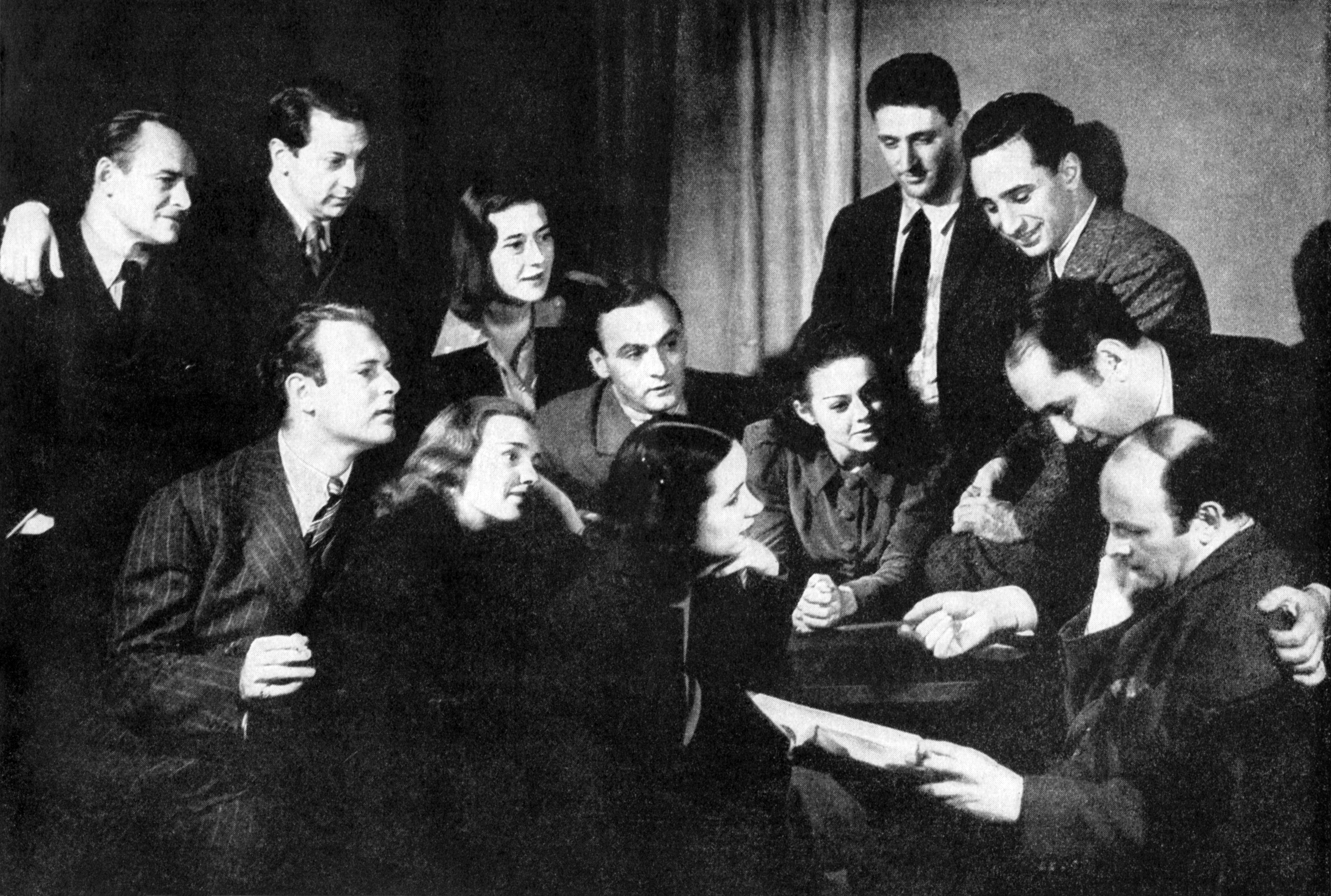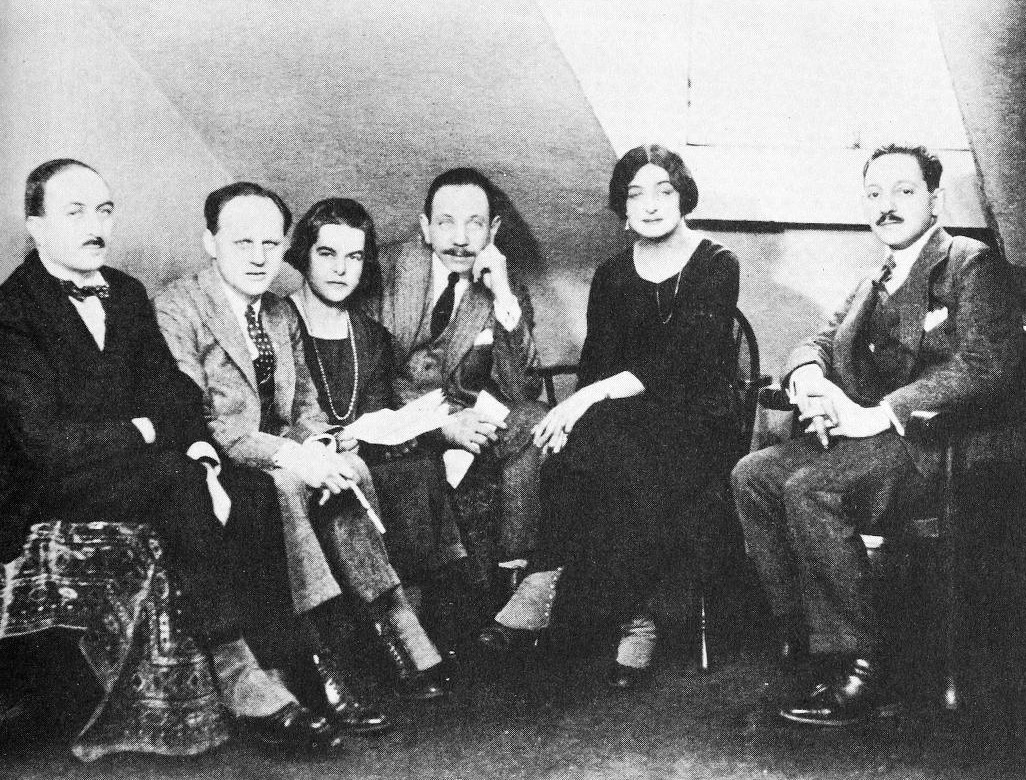|
Harold Clurman
Harold Edgar Clurman (September 18, 1901 – September 9, 1980) was an American theatre director and drama critic. In 2003, he was named one of the most influential figures in U.S. theater by PBS."About Harold Clurman" ''American Masters'', PBS, 2 Dec 2003, accessed 15 Nov 2010 He was one of the three founders of New York City's Group Theatre (1931–1941). He directed more than 40 plays in his career and, during the 1950s, was nominated for a as director for several productions. In addition to his directing career, he was drama cr ... [...More Info...] [...Related Items...] OR: [Wikipedia] [Google] [Baidu] |
Group Theatre (New York)
The Group Theatre was a theater collective based in New York City and formed in 1931 by Harold Clurman, Cheryl Crawford and Lee Strasberg. It was intended as a base for the kind of theatre they and their colleagues believed in— a forceful, naturalistic and highly disciplined artistry. They were pioneers of what would become an "American acting technique", derived from the teachings of Konstantin Stanislavski, but pushed beyond them as well. The company included actors, directors, playwrights, and producers. The name "Group" came from the idea of the actors as a pure ensemble; a reference to the company as "our group" led them to "accept the inevitable and call their company The Group Theatre."Clurman, p. 51 The New York-based Group Theatre had no connection with the identically named Group Theatre based in London and founded in 1932. In the ten years of its existence, the Group Theatre produced works by many important American playwrights, including Clifford Odets, Sidney K ... [...More Info...] [...Related Items...] OR: [Wikipedia] [Google] [Baidu] |
Theatre Guild
The Theatre Guild is a theatrical society founded in New York City in 1918 by Lawrence Langner, Philip Moeller, Helen Westley and Theresa Helburn. Langner's wife, Armina Marshall, then served as a co-director. It evolved out of the work of the Washington Square Players. History Its original purpose was to produce non-commercial works by American and foreign playwrights. It differed from other theaters at the time in that its board of directors shared the responsibility of choosing plays, management, and production. The Theatre Guild contributed greatly to the success of Broadway from the 1920s throughout the 1970s. The Guild has produced a total of 228 plays on Broadway, including 18 by George Bernard Shaw and seven by Eugene O'Neill. Other major playwrights introduced to theatre-going Americans include Robert E. Sherwood, Maxwell Anderson, Sidney Howard, William Saroyan, and Philip Barry. In the field of musical theatre, the Guild has promoted works by Richard Rodgers, teame ... [...More Info...] [...Related Items...] OR: [Wikipedia] [Google] [Baidu] |
Clifford Odets
Clifford Odets (July 18, 1906 – August 14, 1963) was an American playwright, screenwriter, and actor. In the mid-1930s, he was widely seen as the potential successor to Nobel Prize-winning playwright Eugene O'Neill, as O'Neill began to withdraw from Broadway's commercial pressures and increasing critical backlash. From January 1935, Odets's socially relevant dramas were extremely influential, particularly for the remainder of the Great Depression. His works inspired the next several generations of playwrights, including Arthur Miller, Paddy Chayefsky, Neil Simon, and David Mamet. After the production of his play ''Clash by Night (play), Clash by Night'' in the 1941–42 season, Odets focused his energies primarily on film projects, remaining in Hollywood for the next seven years. He returned to New York in 1948 for five and a half years, during which time he produced three more Broadway plays, only one of which was a success. His prominence was eventually eclipsed by Miller, Ten ... [...More Info...] [...Related Items...] OR: [Wikipedia] [Google] [Baidu] |
Elia Kazan
Elia Kazan (; born Elias Kazantzoglou ( el, Ηλίας Καζαντζόγλου); September 7, 1909 – September 28, 2003) was an American film and theatre director, producer, screenwriter and actor, described by ''The New York Times'' as "one of the most honored and influential directors in Broadway and Hollywood history". Born in Constantinople (now Istanbul), to Cappadocian Greek parents, his family came to the United States in 1913. After attending Williams College and then the Yale School of Drama, he acted professionally for eight years, later joining the Group Theatre in 1932, and co-founded the Actors Studio in 1947. With Robert Lewis and Cheryl Crawford, his actors' studio introduced "Method Acting" under the direction of Lee Strasberg. Kazan acted in a few films, including ''City for Conquest'' (1940). His films were concerned with personal or social issues of special concern to him. Kazan writes, "I don't move unless I have some empathy with the basic theme." His ... [...More Info...] [...Related Items...] OR: [Wikipedia] [Google] [Baidu] |
Phoebe Brand
Phoebe Brand (November 27, 1907 – July 3, 2004) was an American actress. Life Brand was born in Syracuse, New York in 1907 and raised in Ilion, Herkimer County, New York. Her father worked for Remington Typewriter Company as a mechanical engineer. She moved to New York City and became an actress, appearing first in several revivals of Gilbert and Sullivan musicals beginning at age 18, and appeared in Winthrop Ames Gilbert and Sullivan Company's production of ''The Mikado'' in Columbus, Ohio in 1928. In New York in 1931, Brand was one of the founders of the Group Theatre, described by ''The New York Times'' as "a radical company that dealt with social issues confronting the United States during the Depression." Her roles included Hennie Berger in Clifford Odets's ''Awake and Sing!'' in 1935 and the role of Anna in his ''Golden Boy'' in 1937. She created the role of Minny Belle in Kurt Weill's '' Johnny Johnson'' in 1936. She summered at Pine Brook Country Club in Nichols, ... [...More Info...] [...Related Items...] OR: [Wikipedia] [Google] [Baidu] |
Morris Carnovsky
Morris Carnovsky (September 5, 1897 – September 1, 1992) was an American stage and film actor. He was one of the founders of the Group Theatre (1931-1940) in New York City and had a thriving acting career both on Broadway and in films until, in the early 1950s, professional colleagues told the House Un-American Activities Committee that Carnovsky had been a Communist Party member. He was blacklisted and worked less frequently for a few years, but then re-established his acting career, taking on many Shakespearean roles at the Stratford Shakespeare Festival and performing the title roles in college campus productions of ''King Lear'' and ''The Merchant of Venice''. Carnovsky's nephew is veteran character actor and longtime "Pathmark Guy" James Karen. Early life Carnovsky was born in St. Louis, Missouri on September 5, 1897 to Ike and Jennie Carnovsky, both Russian Jewish immigrants. His father, a grocer, took him to performances of the Yiddish theater. In 1975 he recall ... [...More Info...] [...Related Items...] OR: [Wikipedia] [Google] [Baidu] |
Stella Adler
Stella Adler (February 10, 1901 – December 21, 1992) was an American actress and acting teacher. '''', April 9, 2008 She founded the in New York City in 1949. Later in life she taught part time in Los Angeles, with the assistance of her protégée, actress , who continued to teach Adler's technique. [...More Info...] [...Related Items...] OR: [Wikipedia] [Google] [Baidu] |
Realism (theatre)
Realism in the theatre was a general movement that began in 19th-century theatre, around the 1870s, and remained present through much of the 20th century. It developed a set of dramatic and theatrical conventions with the aim of bringing a greater fidelity of real life to texts and performances. These conventions occur in the text, (set, costume, sound, and lighting) design, performance style, and narrative structure. They include recreating on stage a facsimile of real life except missing a fourth wall (on proscenium arch stages). Characters speak in naturalistic, authentic dialogue without verse or poetic stylings, and acting is meant to emulate human behaviour in real life. Narratives typically are psychologically driven, and include day-to-day, ordinary scenarios. Narrative action moves forward in time, and supernatural presences (gods, ghosts, fantastic phenomena) do not occur. Sound and music are diegetic only. Part of a broader artistic movement, it includes Naturalism and ... [...More Info...] [...Related Items...] OR: [Wikipedia] [Google] [Baidu] |
Konstantin Stanislavski
Konstantin Sergeyevich Stanislavski ( Alekseyev; russian: Константин Сергеевич Станиславский, p=kənstɐnʲˈtʲin sʲɪrˈgʲejɪvʲɪtɕ stənʲɪˈslafskʲɪj; 7 August 1938) was a seminal Russian Soviet Federative Socialist Republic, Soviet Russian theatre practitioner. He was widely recognized as an outstanding character actor and the many List of productions directed by Konstantin Stanislavski, productions that he directed garnered him a reputation as one of the leading theatre directors of his generation. His principal fame and influence, however, rests on Stanislavski's system, his "system" of actor training, preparation, and rehearsal technique. Stanislavski (his stage name) performed and directed as an Amateur theatre, amateur until the age of 33, when he co-founded the world-famous Moscow Art Theatre (MAT) company with Vladimir Nemirovich-Danchenko, following a legendary 18-hour discussion. Its influential tours of Europe (1906) and ... [...More Info...] [...Related Items...] OR: [Wikipedia] [Google] [Baidu] |
Lee Strasberg
Lee Strasberg (born Israel Strassberg; November 17, 1901 – February 17, 1982) was an American theatre director, actor and acting teacher. He co-founded, with theatre directors Harold Clurman and Cheryl Crawford, the Group Theatre in 1931, which was hailed as "America's first true theatrical collective". In 1951, he became director of the nonprofit Actors Studio in New York City, considered "the nation's most prestigious acting school," and, in 1966, was involved in the creation of Actors Studio West in Los Angeles. Although other highly regarded teachers also developed versions of "The Method," Lee Strasberg is considered to be the "father of method acting in America," according to author Mel Gussow. From the 1920s until his death in 1982, "he revolutionized the art of acting by having a profound influence on performance in American theater and film." From his base in New York, Strasberg trained several generations of theatre and film notables, including Anne Bancroft, D ... [...More Info...] [...Related Items...] OR: [Wikipedia] [Google] [Baidu] |
Cheryl Crawford
Cheryl Crawford (September 24, 1902 – October 7, 1986) was an American theatre producer and director. Biography Born in Akron, Ohio, Crawford majored in drama at Smith College. Following graduation in 1925, she moved to New York City and enrolled at the Theatre Guild's school. By then she knew that she did not want to pursue an acting career, but saw no other way to gain access to the organization producing the highest quality theatre of its time. Finishing her training in 1927, she was hired by Theresa Helburn, the Guild's Executive Director, as a casting secretary. She then worked her way through various backstage jobs, including assistant stage manager, to assistant to the “Board of Managers,” an importantant administrative job. While working at the Guild, she met Harold Clurman and Lee Strasberg who had also been working there as play reader and actor, respectively. She was impressed with these two young men and joined their animated discussions about the need for ... [...More Info...] [...Related Items...] OR: [Wikipedia] [Google] [Baidu] |
Fyodor Dostoevsky
Fyodor Mikhailovich Dostoevsky (, ; rus, Фёдор Михайлович Достоевский, Fyódor Mikháylovich Dostoyévskiy, p=ˈfʲɵdər mʲɪˈxajləvʲɪdʑ dəstɐˈjefskʲɪj, a=ru-Dostoevsky.ogg, links=yes; 11 November 18219 February 1881), sometimes transliterated as Dostoyevsky, was a Russian novelist, short story writer, essayist and journalist. Dostoevsky's literary works explore the human condition in the troubled political, social, and spiritual atmospheres of 19th-century Russia, and engage with a variety of philosophical and religious themes. His most acclaimed novels include ''Crime and Punishment'' (1866), ''The Idiot'' (1869), ''Demons'' (1872), and ''The Brothers Karamazov'' (1880). His 1864 novella, ''Notes from Underground'', is considered to be one of the first works of existentialist literature. Numerous literary critics regard him as one of the greatest novelists in all of world literature, as many of his works are considered highly influen ... [...More Info...] [...Related Items...] OR: [Wikipedia] [Google] [Baidu] |



.jpg)



